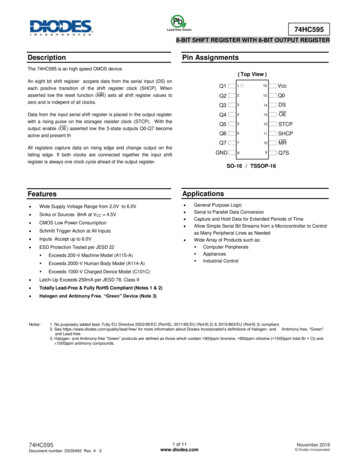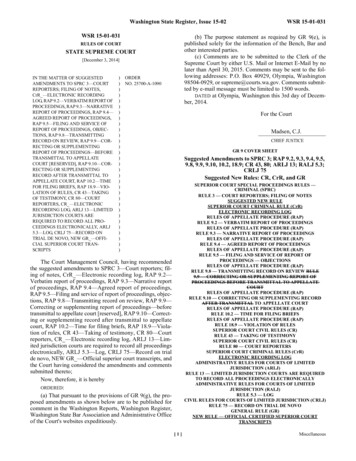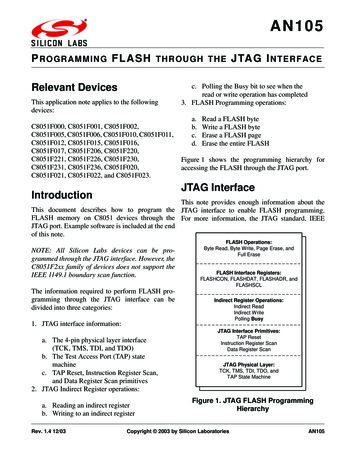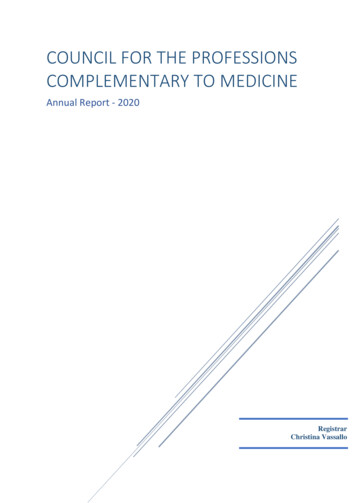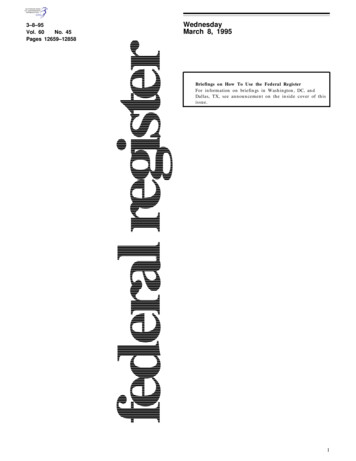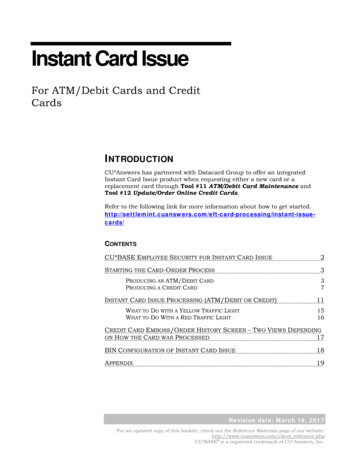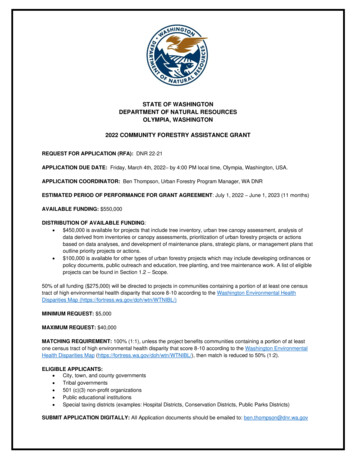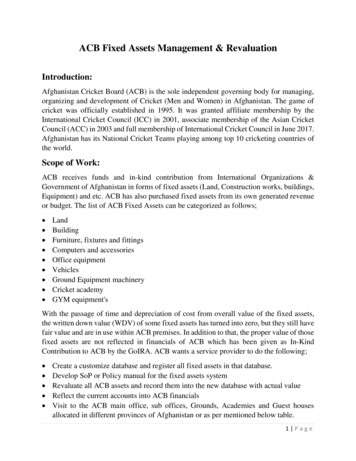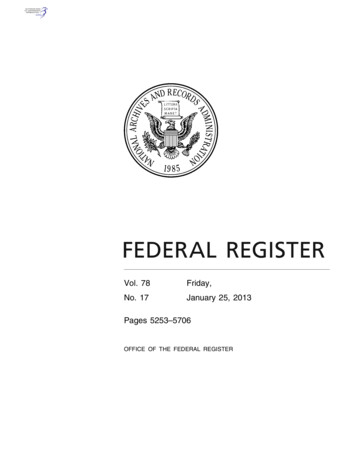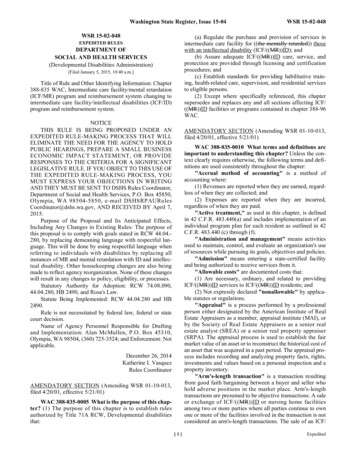
Transcription
Washington State Register, Issue 15-04WSR 15-02-048WSR 15-02-048(a) Regulate the purchase and provision of services inintermediate care facility for ((the mentally retarded)) thosewith an intellectual disability (ICF/((MR))ID); and(b) Assure adequate ICF/((MR))ID care, service, andprotection are provided through licensing and certificationprocedures; and(c) Establish standards for providing habilitative training, health-related care, supervision, and residential servicesto eligible persons.(2) Except where specifically referenced, this chaptersupersedes and replaces any and all sections affecting ICF/((MR))ID facilities or programs contained in chapter 388-96WAC.EXPEDITED RULESDEPARTMENT OFSOCIAL AND HEALTH SERVICES(Developmental Disabilities Administration)[Filed January 5, 2015, 10:40 a.m.]Title of Rule and Other Identifying Information: Chapter388-835 WAC, Intermediate care facility/mental retardation(ICF/MR) program and reimbursement system changing tointermediate care facility/intellectual disabilities (ICF/ID)program and reimbursement system.NOTICETHIS RULE IS BEING PROPOSED UNDER ANEXPEDITED RULE-MAKING PROCESS THAT WILLELIMINATE THE NEED FOR THE AGENCY TO HOLDPUBLIC HEARINGS, PREPARE A SMALL BUSINESSECONOMIC IMPACT STATEMENT, OR PROVIDERESPONSES TO THE CRITERIA FOR A SIGNIFICANTLEGISLATIVE RULE. IF YOU OBJECT TO THIS USE OFTHE EXPEDITED RULE-MAKING PROCESS, YOUMUST EXPRESS YOUR OBJECTIONS IN WRITINGAND THEY MUST BE SENT TO DSHS Rules Coordinator,Department of Social and Health Services, P.O. Box 45850,Olympia, WA 98504-5850, e-mail DSHSRPAURulesCoordinator@dshs.wa.gov, AND RECEIVED BY April 7,2015.Purpose of the Proposal and Its Anticipated Effects,Including Any Changes in Existing Rules: The purpose ofthis proposal is to comply with goals stated in RCW 44.04.280, by replacing demeaning language with respectful language. This will be done by using respectful language whenreferring to individuals with disabilities by replacing allinstances of MR and mental retardation with ID and intellectual disability. Other housekeeping changes are also beingmade to reflect agency reorganization. None of these changeswill result in any changes to policy, eligibility, or processes.Statutory Authority for Adoption: RCW 74.08.090,44.04.280, HB 2490, and Rosa's Law.Statute Being Implemented: RCW 44.04.280 and HB2490.Rule is not necessitated by federal law, federal or statecourt decision.Name of Agency Personnel Responsible for Draftingand Implementation: Alan McMullen, P.O. Box 45310,Olympia, WA 98504, (360) 725-3524; and Enforcement: Notapplicable.AMENDATORY SECTION (Amending WSR 01-10-013,filed 4/20/01, effective 5/21/01)WAC 388-835-0010 What terms and definitions areimportant to understanding this chapter? Unless the context clearly requires otherwise, the following terms and definitions are used consistently throughout the chapter:"Accrual method of accounting" is a method ofaccounting where:(1) Revenues are reported when they are earned, regardless of when they are collected; and(2) Expenses are reported when they are incurred,regardless of when they are paid."Active treatment," as used in this chapter, is definedin 42 C.F.R. 483.440(a) and includes implementation of anindividual program plan for each resident as outlined in 42C.F.R. 483.440 (c) through (f)."Administration and management" means activitiesused to maintain, control, and evaluate an organization's useof resources while pursuing its goals, objectives and policies."Admission" means entering a state-certified facilityand being authorized to receive services from it."Allowable costs" are documented costs that:(1) Are necessary, ordinary, and related to providingICF/((MR))ID services to ICF/((MR))ID residents; and(2) Not expressly declared "nonallowable" by applicable statutes or regulations."Appraisal" is a process performed by a professionalperson either designated by the American Institute of RealEstate Appraisers as a member, appraisal institute (MAI), orby the Society of Real Estate Appraisers as a senior realestate analyst (SREA) or a senior real property appraiser(SRPA). The appraisal process is used to establish the fairmarket value of an asset or to reconstruct the historical cost ofan asset that was acquired in a past period. The appraisal process includes recording and analyzing property facts, rights,investments and values based on a personal inspection and aproperty inventory."Arm's-length transaction" is a transaction resultingfrom good faith bargaining between a buyer and seller whohold adverse positions in the market place. Arm's-lengthtransactions are presumed to be objective transactions. A saleor exchange of ICF/((MR))ID or nursing home facilitiesamong two or more parties where all parties continue to ownone or more of the facilities involved in the transaction is notconsidered an arm's-length transactions. The sale of an ICF/December 26, 2014Katherine I. VasquezRules CoordinatorAMENDATORY SECTION (Amending WSR 01-10-013,filed 4/20/01, effective 5/21/01)WAC 388-835-0005 What is the purpose of this chapter? (1) The purpose of this chapter is to establish rulesauthorized by Title 71A RCW, Developmental disabilitiesthat:[1]Expedited
WSR 15-02-048Washington State Register, Issue 15-04((MR))ID facility that is subsequently leased back to theseller within five years of the date of sale is not considered anarm's-length transaction for purposes of chapter 388-835WAC."Assets" are economic resources of the provider, recognized, and measured in conformity with generally acceptedaccounting principles. Assets also include deferred chargesthat are recognized and measured according to generallyaccepted accounting principles. (The value of assets acquiredin a change of ownership transaction entered into after September 30, 1984, cannot exceed the acquisition cost of theowner of record as of July 18, 1984.)"Bad debts" or "uncollectable accounts" are amountsconsidered uncollectable from accounts and notes receivable.Generally accepted accounting principles must be followedwhen accounting for bad debts."Beds," unless otherwise specified, means the numberof set-up beds in an ICF/((MR))ID facility. The number ofset-up beds cannot exceed the number of licensed beds for thefacility."Beneficial owner": For a definition, see WAC 388835-0015."((Boarding home)) Assisted living facility" meansany home or other institution licensed according to therequirements of chapter 18.20 RCW."Capitalization" means recording expenditures asassets."Capitalized lease" is a lease that is recorded, according to generally accepted accounting principles, as an assetwith an associated liability."Cash method of accounting" is a method of accounting where revenues are recorded only when cash is receivedand expenses are not recorded until cash is paid."Change of ownership," see WAC 388-835-0020."Charity allowances" are reductions in a provider'scharges because of the indigence or medical indigence of aresident."Consent" means the process of obtaining a person'spermission before initiating procedures or actions against thatperson."Contract" means a contract between the departmentand a provider for the delivery of ICF/((MR))ID services toeligible medicaid recipients.(("Provider" means an entity contracting with thedepartment to deliver ICF/MR services to eligible medicaidrecipients.))"Courtesy allowances" are reductions in charges tophysicians, clergy, and others for services received from aprovider. Employee fringe benefits are not considered courtesy allowances."Custody" means the immediate physical confinement,sheltering and supervision of a person in order to providethem with care and protect their welfare."((DDD)) DDA" means the ((division of)) developmental disabilities administration of the department."Department" means the department of social andhealth services (DSHS) and its employees."Depreciation" is the systematic distribution of the cost(or depreciable base) of a tangible asset over its estimateduseful life.Expedited"Discharge" means the process that takes place when:(1) A resident leaves a residential facility; and(2) The facility relinquishes any responsibility itacquired when the resident was admitted."Donated asset" is an asset given to a provider withoutany payment in cash, property, or services. An asset is notconsidered donated if the provider makes a nominal paymentwhen acquiring it. An asset purchased using donated funds isnot a donated asset."Entity" means an individual, partnership, corporation,public institution established by law, or any other associationof individuals, capable of entering into enforceable contracts."Equity capital" is the total tangible and other assetsthat are necessary, ordinary, and related to resident care listedon a provider's most recent cost report minus the total relatedlong-term debt from the same cost report plus working capital as defined in this section."Exemption" means a department approved writtenrequest asking for an exception to a rule in this chapter."Facility" means a residential setting certified, according to federal regulations, as an ICF/((MR))ID by the department. A state facility is a state-owned and operated residential living center. A private facility is a residential settinglicensed as a nursing home under chapter 18.51 RCW or aboarding home licensed under chapter 18.20 RCW."Fair market value" is the purchase price of an assetresulting from an arm's-length transaction between a wellinformed buyer and seller, neither being under any compulsion to buy or sell."Financial statements" are statements prepared andpresented according to generally accepted accounting principles and practice and the requirements of this chapter. Financial statements and their related notes include, but are notlimited to, balance sheet, statement of operations, and statement of change in financial position."Fiscal year" is the operating or business year of a provider. Providers report on the basis of a twelve-month fiscalyear, but this chapter allows reports covering abbreviated fiscal periods."Funded capacity," for a state facility, is the number ofbeds on file with the office of financial management."Generally accepted accounting principles" are theaccounting principles currently approved by the financialaccounting standard board (FASB)."Generally accepted auditing standards" are theauditing standards currently approved by the American Institute of Certified Public Accountants (AICPA)."Goodwill" is the excess of the purchase price of a business over the fair market value of all identifiable, tangible,and intangible assets acquired. "Goodwill" also means theexcess of the price paid for an asset over fair market value."Habilitative services" means those services requiredby an individual habilitation plan."Harmful" is when an individual is at immediate risk ofserious bodily harm."Historical cost" is the actual cost incurred in acquiringand preparing an asset for use, including feasibility studies,architects' fees, and engineering studies.[2]
Washington State Register, Issue 15-04"Imprest fund" is a fund:(1) Regularly replenished for the amounts expendedfrom it; and(2) The cash in the fund and the receipts for expendituresshould always equal a predetermined amount.(3) An example of an imprest fund is a petty cash fund."ICF/((MR))ID" means a facility certified by Title XIXas an intermediate care facility for providing services to persons with mental retardation or related conditions."Interest" is the cost incurred for the use of borrowedfunds, generally paid at fixed intervals by the borrower."Joint facility costs" are any expenses incurred thatbenefit more than one facility or a facility and any otherentity."Lease agreement" is a contract for a specified periodof time between two parties regarding the possession and useof real or personal property and/or assets in exchange forspecified periodic payments."Medicaid program" means either the state medicalassistance program provided under RCW 74.09.500 or authorized state medical services."Medical assistance recipient" is an individual that thedepartment declares eligible for medical assistance servicesprovided in chapter 74.09 RCW."Modified accrual method of accounting" is a methodof accounting that records revenues only when cash isreceived and records expenses when they are incurred,regardless of when they are paid."Net book value" is the historical cost of an asset lessits accumulated depreciation."Nonallowable costs" are costs that are not documented, necessary, ordinary and related to providing servicesto residents."Nonrestricted funds" are donated funds not restrictedto a specific use by the donor. General operating funds are anexample of nonrestricted funds."Nursing facility" means a home, place, or institution,licensed or certified according to chapter 18.51 RCW."Operating lease" is a lease, according to generallyaccepted accounting principles, that requires rental or leasepayments to be charged to current expenses when they areincurred."Ordinary costs" are costs that, by their nature andmagnitude, a prudent and cost conscious management wouldpay."Owner" means a sole proprietor, general or limitedpartner, or beneficial interest holder of at least five percent ofa corporation's outstanding stock."Ownership interest" means all beneficial interestsowned by a person (calculated in the aggregate) regardless ofthe form such beneficial ownership takes. Also, see WAC388-835-0015."Per diem costs" or "per resident day costs" are totalallowable costs for a fiscal period divided by total residentdays for that same period."Prospective daily payment rate" is the daily amountthe department assigns to each provider for providing services to ICF/((MR))ID residents. The rate is used to computethe department's maximum participation in the provider'scost.WSR 15-02-048"Provider" means an entity contracting with the department to deliver ICF/ID services to eligible medicaid recipients."Qualified ((mental retardation)) intellectual disability professional (((QMRP)) QIDP)" means ((QMRP))QIDP as defined under 42 C.F.R. 483.430(a)."Qualified therapist," see WAC 388-835-0030."Regression analysis" is a statistical technique used toanalyze the relationship between a dependent or criterionvariable and a set of independent or predictor variables."Regional services" are the services of a local office ofthe ((division of)) developmental disabilities administration."Related organization" is an entity that either controlsanother entity or is controlled by another entity or provider.Control results from common ownership or the ability toexercise significant influence on the other entity's activities.Control occurs when an entity or provider has:(1) At least a five percent ownership interest in the otherentity; or(2) The ability to influence the activities of the other."Relative" means spouse; natural parent, child, or sibling; adopted child or adoptive parent; stepparent, stepchild,stepbrother, stepsister; father-in-law, mother-in-law, son-inlaw, daughter-in-law, brother-in-law, sister-in-law; grandparent or grandchild; uncle, aunt, nephew, niece, or cousin."Resident" or "person" means a person the ((division))administration determines is, under RCW 71A.16.040 eligible for ((division)) administration-funded services."Resident day" means a calendar day of resident care.When computing calendar days of resident care, the day ofadmission is always counted. The day of discharge is countedonly when discharge and admission occur on the same day.For the purpose of this definition, a person is consideredadmitted when they are assigned a bed and a resident recordis opened for them."Resident care and training staff" are staff whose primary responsibility is the care and development of the residents, including:(1) Resident activity program;(2) Domiciliary services; and(3) Habilitative services under the supervision of a((QMRP)) QIDP."Restricted fund" is a fund where the donor restrictsthe use of the fund principal or income to a specific purpose.Restricted funds generally fall into one of three categories:(1) Funds restricted to specific operating purposes; or(2) Funds restricted to additions of property, plant, andequipment; or(3) Endowment funds."RHC" - Residential habilitation center. A facilityowned and operated by the state and is certified as an ICF/((MR))ID or a nursing facility."Secretary" means the secretary of DSHS."Start-up costs" are the one-time costs incurred fromthe time preparations begin on a newly constructed or purchased building until the first resident is admitted. Such"preopening" costs include, but are not limited to, administrative and nursing salaries, utility costs, taxes, insurance,repairs and maintenance, and training costs. Start-up costs donot include expenditures for capital assets.[3]Expedited
WSR 15-02-048Washington State Register, Issue 15-04"Superintendent" means the superintendent of a residential habilitation center (RHC) or the superintendent's designee."Title XIX" means the 1965 amendments to the SocialSecurity Act, P.L. 89-07, as amended."Uniform chart of accounts" means a list of department established account titles and related code numbers thatproviders must use when reporting costs."Vendor number" or "provider number" is a numberassigned by the department to each provider who deliversICF/((MR))ID services to ICF/((MR))ID medicaid recipients."Working capital" is the difference between the totalcurrent assets that are necessary, ordinary, and related to resident care, as reported in a provider's most recent cost report,and the total current liabilities necessary, ordinary, andrelated to resident care reported in the same cost report.(3) A dental hygienist defined, licensed and regulated bychapter 18.29 RCW;(4) A dietitian either:(a) Eligible for registration by the American DieteticAssociation under requirements in effect on January 17,1974; or(b) With a baccalaureate degree whose major studiescovered food and nutrition, dietetics, or food service management; plus one year supervisory experience in the dieteticservice of a health care institution; and annual participation incontinuing dietetic education;(5) An occupational therapist who graduated from a program in occupational therapy or who possesses the equivalentof such education or training and meets all Washington statelegal requirements;(6) A pharmacist who is licensed by the Washingtonstate board of pharmacy to engage in the practice of pharmacy;(7) A physical therapist, meaning someone practicingphysical therapy as defined in RCW 18.74.010(3). Physicaltherapist does not include massage operators as defined inRCW 18.108.010;(8) A physician as defined, licensed and regulated bychapter 18.71 RCW or an osteopathic physician as defined,licensed and regulated by chapter 18.57 RCW;(9) A psychologist as defined, licensed and regulated bychapter 18.83 RCW;(10) A qualified ((mental retardation)) intellectual disability professional;(11) A registered nurse as defined by chapter 18.88ARCW;(12) A social worker who is a graduate of a school ofsocial work; or(13) A speech pathologist either:(a) Eligible for a certificate of clinical competence inspeech pathology; or(b) Possessing the equivalent education and clinicalexperience.AMENDATORY SECTION (Amending WSR 01-10-013,filed 4/20/01, effective 5/21/01)WAC 388-835-0020 What is a "change in ownership"? (1) A "change in ownership" is a change in the individual or legal organization responsible for the daily operation of an ICF/((MR))ID facility.(2) Types of events causing a change in ownershipinclude but are not limited to:(a) Changing the form of legal organization of the owner,such as a sole proprietorship becomes a partnership or corporation;(b) Transferring the title to the ICF/((MR))ID enterprisefrom the provider to another party;(c) Leasing the ICF/((MR))ID facility to another party oran existing lease is terminated;(d) When the provider is a partnership, any event thatdissolves the partnership;(e) When the provider is a corporation and the corporation:(i) Is dissolved;(ii) Merges with another corporation which is the survivor; or(iii) Consolidates with one or more other corporations toform a new corporation.(3) Ownership does not change when:(a) The provider contracts with another party to managethe facility and act as the provider's agent subject to the provider's general approval of daily operating decisions; or(b) When the provider is a corporation, some or all of itscorporate stock is transferred.AMENDATORY SECTION (Amending WSR 01-10-013,filed 4/20/01, effective 5/21/01)WAC 388-835-0040 What general requirementsapply to ICF/MR care facilities? The following generalrequirements apply:(1) The ((division)) administration will recognize onlythe official name of an ICF/((MR))ID as shown on thelicense.(2) All state and private ICF/((MR))ID facilities must becertified as a Title XIX ((IMR)) ICF/((MR))ID facility.(3) All private ICF/((MR))ID facilities with a certifiedcapacity of at least sixteen beds must be licensed as a nursinghome under chapter 18.51 RCW, Nursing homes.(4) All private ICF/((MR))ID facilities with a certifiedcapacity of less than sixteen beds must be licensed as a boarding home for the aged under chapter 18.20 RCW.(5) All facilities certified to provide ICF/((MR))ID services must comply with all applicable Title XIX, Section1905 of the Social Security Act 42 U.S.C federal regulationsas amended. In addition, all private-operated facilities mustAMENDATORY SECTION (Amending WSR 01-10-013,filed 4/20/01, effective 5/21/01)WAC 388-835-0030 What is a "qualified therapist"?A qualified therapist is any of the following:(1) An activity specialist who has department specifiedspecialized education, training, or experience;(2) An audiologist eligible for a certificate of clinicalcompetency in audiology or possessing the equivalent education and clinical experience;Expedited[4]
Washington State Register, Issue 15-04WSR 15-02-048kin, or responsible party must be informed by DSHS in writing thirty days before any redetermination of their eligibilityfor ICF/((MR))ID services takes place.(2) The redetermination notice must include:(a) The reasons for the proposed eligibility change;(b) A statement that the resident or any other individualdesignated by the resident has a right to a conference with a((DDD)) DDA representative within thirty days of receipt ofthe notice;(c) A statement that the resident has the right to request ahearing to contest the department's decision within thirtydays of the notice;(d) Information as to how a hearing can be requested;(e) A statement that the resident has the right to be represented at the hearing by an authorized representative; and(f) Information regarding the availability and location oflegal services within the resident's community.comply with state regulation governing the licensing of nursing homes or boarding homes for the aged and any other relevant state regulations.(6) All certified facilities must only admit persons withdevelopmental disabilities as residents.(7) State facilities may not exceed funded capacityunless authorized by the secretary to do so (see RCW71A.20.090).AMENDATORY SECTION (Amending WSR 01-10-013,filed 4/20/01, effective 5/21/01)WAC 388-835-0045 What are the minimum staffrequirements for an ICF/((MR))ID facility? All ICF/((MR))ID facilities must provide sufficient number of qualified staff to meet the needs of their residents.AMENDATORY SECTION (Amending WSR 01-10-013,filed 4/20/01, effective 5/21/01)AMENDATORY SECTION (Amending WSR 01-10-013,filed 4/20/01, effective 5/21/01)WAC 388-835-0050 What general requirementsapply to the quality of ICF/((MR))ID services? (1) DSHSis responsible for assuring the:(a) Health care and habilitative training needs of an individual are identified and met according to state and federalregulations.(b) Individual is placed in a facility certified as capableof meeting their needs.(2) ((DDD)) DDA regional service staff is responsiblefor authorizing changes in residential services.(3) All services provided must be essential to the resident's habilitation and health care needs and to achieving theprimary goal of attaining the highest level of independencepossible for each individual resident.(4) A resident in an ICF/((MR))ID is eligible for community residential services when such services meet their needs.(5) Every ICF/((MR))ID must provide habilitative training and health care that at least includes the following:(a) Active treatment;(b) Services according to the identified needs of the individual resident and provided by or under the supervision ofqualified therapists;(c) Routine items and supplies provided uniformly to allresidents;(d) Providing necessary surgical appliances, prostheticdevices, and aids to mobility for the exclusive use of individual residents;(e) Nonreusable supplies not usually provided to all residents may be individually ordered. A department representative must authorize requests for such supplies.(6) Each ICF/((MR))ID facility is responsible for providing transportation for residents. This responsibility mayinclude the guarantee of a resident's use of public transportation.WAC 388-835-0060 What are DSHS responsibilitieswhen it decides to redetermine a resident eligibility forICF/((MR))ID services? DSHS must send a hearing requestform with the notice of redetermination.(1) If the resident requests a hearing within the thirty-daytime period, DSHS must not redetermine eligibility until ahearing decision is reached or appeal rights have beenexhausted unless redetermination is warranted by the resident's health or safety needs.(2) If the secretary or the secretary's designee concludesthat redetermination is not appropriate, no further action willbe taken to redetermine eligibility unless there is a change inthe situation or circumstances. If there is a change in the situation or circumstances, the request may be resubmitted.(3) If the secretary or the secretary's designee affirms thedecision to change the resident's eligibility and no judicialreview is filed within thirty days of the receipt of notice ofredetermination, the department must proceed with theplanned action.(4) If the secretary or secretary's designee affirms thedecision to change the resident's eligibility and a request forjudicial review has been filed, any proposed redeterminationmust be delayed until the appeal process is complete unless adelay jeopardizes the resident's health or safety.AMENDATORY SECTION (Amending WSR 01-10-013,filed 4/20/01, effective 5/21/01)WAC 388-835-0070 What requirements apply to theplacement of individuals in an ICF/((MR))ID facility? (1)Placing individuals in an ICF/((MR))ID facility is the responsibility of the ((division of)) developmental disabilitiesadministration and must be done according to applicable federal and state regulations.(2) A facility may not admit an individual who requiresservices the facility cannot provide.(3) Department representatives must determine an individual's eligibility for ICF/((MR))ID services before paymentcan be approved.AMENDATORY SECTION (Amending WSR 01-10-013,filed 4/20/01, effective 5/21/01)WAC 388-835-0055 What are the resident's rights ifDSHS decides that they are no longer eligible for ICF/((MR))ID services? (1) A resident, their guardian, next-of[5]Expedited
WSR 15-02-048Washington State Register, Issue 15-04AMENDATORY SECTION (Amending WSR 01-10-013,filed 4/20/01, effective 5/21/01)(3) Medical reasons dictate relocation;(4) A resident's welfare would be improved;(5) The welfare of the other residents would beenhanced;(6) There is no payment for services provided to the resident during their stay at the facility;(7) The resident and/or guardian make a formal request;(8) The facility is partially closing; or(9) The facility is closing.WAC 388-835-0075 What if an individual is transferred between facilities? (1) When an individual is transferred between facilities, all essential information concerningthe individual, their condition, regimen of care and trainingmust be transmitted, in writing, by the sending facility to thereceiving facility at the time of the transfer.(2) "Transferred between facilities" means transferredfrom:(a) An ICF/((MR))ID to ICF/((MR))ID;(b) An ICF/((MR))ID to a hospital;(c) A hospital to an ICF/((MR))ID; or(d) An ICF/((MR))ID or hospital to alternative community placement.AMENDATORY SECTION (Amending WSR 01-10-013,filed 4/20/01, effective 5/21/01)WAC 388-835-0105 What are DSHS' responsibilitiesfor placing individuals? (1) When services available to anindividual do not meet their needs, the department is responsible for initiating and facilitating the resident's relocation.(2) The department may enforce immediate movementof a resident from an ICF/((MR))ID facility when the facility's ICF/((MR))ID certification or license is revoked or suspended.(3) The department must notify a resident and theirguardian, next of kin, or responsible party, in writing, when:(a) DSHS or ((Health Care Financing Administration(HCFA))) Centers for Medicare and Medicaid (CMS) determines a facility no longer meets certification requirements asan ICF/((MR))ID;(b) DSHS determines the facility does not meet contractrequirements; or(c) A facility voluntarily terminates their contract withDSHS or stops participating in the ICF/((MR))ID program.AMENDATORY SECTION (Amending WSR 01-10-013,filed 4/20/01, effective 5/21/01)WAC 388-835-0080 What if an ICF/((MR))ID facility is closed? (1) When a facility plans to close, it must notifythe department, in writing, at least one hundred and eightydays before the date of closure.(2) Upon receipt of a notice of closure, the departmentmust stop referring individuals to the facility and begin theorderly transfer of its residents.AMENDATORY SECTION (Amending WSR 01-10-013,filed 4/20/01, effective 5/21/01)WAC 388-835-0095 Is a transfer plan required foreach resident? (1) ((DDD)) DDA must prepare a writtenplan fo
tual disability. Other housekeeping changes are also being made to reflect agency reorgani zation. None of these changes will result in any changes to policy, eligibility, or processes. Statutory Authority for Adoption: RCW 74.08.090, 44.04.280, HB 2490, and Rosa's Law. Statute Being Implemented: RCW 44.04.280 and HB 2490.
